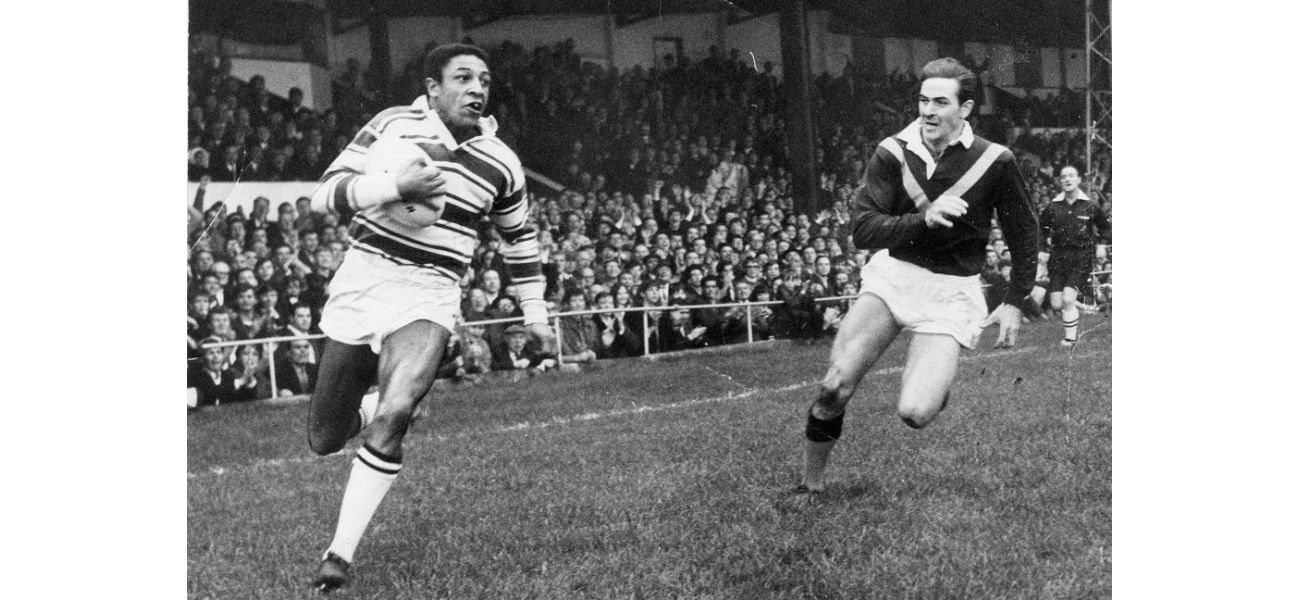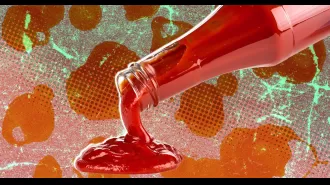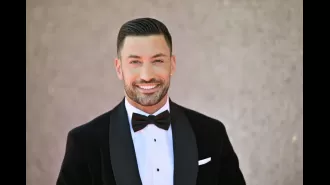Despite being told he couldn't play, my dad led Great Britain to win in 1972.
Clive Sullivan, my father, was a tough and brave man who never let anything hold him back.
October 26th 2024.

My father, Clive Sullivan, was always known for his fear of heights. He couldn't even stand the thought of climbing ladders to fix the gutter or any other job that involved heights. It was something that he just couldn't bring himself to do. However, one day when I was about 10 years old, he surprised me with a shocking revelation. He had been a paratrooper in the army.
I was completely bewildered by this news. "But Dad, you're scared of heights!" I exclaimed. He calmly replied, "I know. That's exactly why I joined the paratroopers - to overcome my fear." That's just who my father was - determined to never let his fears hold him back and always pushing himself to overcome any obstacles. He was tough, resilient, and incredibly brave.
Although my father didn't stay in the paratroopers for too long, it wasn't because of his fear of heights. He went on to become a world-class rugby player, a true legend in the Welsh rugby league. He played for both Hull FC and Hull Kingston Rovers, as well as representing his country on the international level. In 1972, he made history by becoming the first Black athlete to captain a British national team.
While his achievements on the field were truly outstanding, for me, the most remarkable thing about my father was his leadership as a captain. In 1972, his team won the Rugby League World Cup, which was an incredible feat. It speaks volumes about my father's character and determination. He was more than just a great athlete, he was a true leader.
My father was born in 1943 in Splott, a suburb of Cardiff. His childhood was not an easy one, as he suffered from a mysterious muscle disease that was never fully diagnosed. He was even told that he would never be able to play any sports and may struggle with walking. But my father was not one to give up easily. In 1961, he joined the army after completing his schooling in Yorkshire.
It was during his time in the army that his rugby career began. He was asked to play in an army rugby match simply because he was Welsh, and as we all know, the Welsh "must" play rugby. He played exceptionally well, and that sparked his dream of playing rugby professionally. Despite facing numerous challenges and rejections, he never gave up on his dream.
After leaving the army in 1964, my father's career took off. He became Hull FC's leading try-scorer and was known for his incredible speed. He also represented his country in the 1968 and 1972 World Cups, where he eventually became the captain of the Great Britain team. He was a proud Welshman, and his heritage and country meant everything to him.
One of my fondest memories is watching my father play in the 1980 Challenge Cup Final, where he represented Hull Kingston Rovers against Hull FC. I was only about 11 years old at the time, but it was a moment I will never forget. As a supporter of Hull KR and as Clive Sullivan's son, it meant the world to me. I remember how nervous he was before the game, and I could see how much it meant to him.
My father's success on the field was unmatched, but what truly makes me proud is hearing about the kind of man he was. His former teammates, opponents, and people who knew him have all spoken highly of him. They say he was not only a great rugby player but also a great human being. He always had time for people, was friendly, and a great teammate. That, to me, is more important than any of his career highlights.
To me, my father was just my dad. We used to go and watch him play rugby, but I never saw him as the public figure that he became through his accomplishments. It wasn't until recently, with the increasing recognition of his achievements, that I started to truly understand and appreciate all that he had accomplished. But for me, he will always be just my dad. A determined, resilient, and kind-hearted man who never let his fears or anything else hold him back.
My father, Clive Sullivan, was a man who could conquer any challenge, except for one - his fear of heights. He couldn't stand the thought of climbing up a ladder to fix the gutters or any other task that involved heights. But despite this fear, he surprised me one day when I was ten years old by revealing that he had once been a paratrooper in the army. I couldn't believe it. "But Dad, you're scared of heights!" I exclaimed, confused by this revelation. "I know," he replied. "That's why I joined the paratroopers - to overcome my fear." That was my dad in a nutshell - determined, fearless, and never willing to let anything hold him back.
My father may have only been a paratrooper for a short time, but it wasn't because of his fear of heights. He went on to become a world-renowned rugby player, known for his incredible speed. Described as a "Welsh rugby league legend" and "one of Hull's greatest sporting heroes," he played for both Hull FC and Hull Kingston Rovers, and even represented his country on an international level. In 1972, he made history by becoming the first Black athlete to captain a British national team. It was an amazing achievement, but for me, the true measure of his greatness was in being the captain of a rugby team, let alone a World Cup-winning team.
My dad's journey began in 1943 when he was born in Splott, a suburb of Cardiff. Growing up, it didn't seem likely that he would become a rugby player, as he had a mysterious muscle disease that was never fully diagnosed. He even had to spend some time in leg casts and was told that he would never be able to play any sports. But my father was determined to prove them wrong. After leaving school, he joined the army in 1961.
While stationed in Yorkshire, he was asked to play in an army rugby match because, well, he was Welsh, and it was assumed he must play rugby. And so, his rugby career began. He played exceptionally well and realized that he could play professionally, against all odds. He went for a trial at Bradford Northern, but they turned him down. However, Hull saw his potential and signed him. From then on, his career only went from strength to strength, becoming Hull FC's leading try-scorer and gaining a reputation for his remarkable speed.
My father's international career started in 1967, and he played three World Cup matches in 1968. But his biggest achievement came in 1972 when he captained Great Britain. I don't recall him talking much about it at the time, but I can only imagine how proud and pleased he must have been to lead his country and then go on to win the World Cup. He was a proud Welshman, and his heritage and country meant everything to him.
In 1974, my father joined Hull Kingston Rovers, and I have fond memories of watching him play in the 1980 Challenge Cup Final against his former team, Hull FC. I was only eleven, but it was a significant moment for me as a Hull KR supporter and the son of Clive Sullivan. I remember how nervous he was before the game, and how much it meant to him. He had always dreamed of playing in the Challenge Cup Final, and now he was living that dream. We even had the chance to witness him play in another final in 1982, which was a great success.
But beyond all his achievements on the field, I have been told by his teammates, opponents, and those who knew him that my father was not only a great rugby player but also a great man. He was kind, friendly, and always had time for people. That makes me prouder than any number of career highlights. To me, he was simply my dad, and our memories of watching him play rugby together will always be cherished. Despite his public persona and numerous accomplishments, I never really identified him as anything other than my dad. It's only been in recent years, with the growing recognition of everything he achieved, that I've truly come to appreciate the incredible man that he was.
I was completely bewildered by this news. "But Dad, you're scared of heights!" I exclaimed. He calmly replied, "I know. That's exactly why I joined the paratroopers - to overcome my fear." That's just who my father was - determined to never let his fears hold him back and always pushing himself to overcome any obstacles. He was tough, resilient, and incredibly brave.
Although my father didn't stay in the paratroopers for too long, it wasn't because of his fear of heights. He went on to become a world-class rugby player, a true legend in the Welsh rugby league. He played for both Hull FC and Hull Kingston Rovers, as well as representing his country on the international level. In 1972, he made history by becoming the first Black athlete to captain a British national team.
While his achievements on the field were truly outstanding, for me, the most remarkable thing about my father was his leadership as a captain. In 1972, his team won the Rugby League World Cup, which was an incredible feat. It speaks volumes about my father's character and determination. He was more than just a great athlete, he was a true leader.
My father was born in 1943 in Splott, a suburb of Cardiff. His childhood was not an easy one, as he suffered from a mysterious muscle disease that was never fully diagnosed. He was even told that he would never be able to play any sports and may struggle with walking. But my father was not one to give up easily. In 1961, he joined the army after completing his schooling in Yorkshire.
It was during his time in the army that his rugby career began. He was asked to play in an army rugby match simply because he was Welsh, and as we all know, the Welsh "must" play rugby. He played exceptionally well, and that sparked his dream of playing rugby professionally. Despite facing numerous challenges and rejections, he never gave up on his dream.
After leaving the army in 1964, my father's career took off. He became Hull FC's leading try-scorer and was known for his incredible speed. He also represented his country in the 1968 and 1972 World Cups, where he eventually became the captain of the Great Britain team. He was a proud Welshman, and his heritage and country meant everything to him.
One of my fondest memories is watching my father play in the 1980 Challenge Cup Final, where he represented Hull Kingston Rovers against Hull FC. I was only about 11 years old at the time, but it was a moment I will never forget. As a supporter of Hull KR and as Clive Sullivan's son, it meant the world to me. I remember how nervous he was before the game, and I could see how much it meant to him.
My father's success on the field was unmatched, but what truly makes me proud is hearing about the kind of man he was. His former teammates, opponents, and people who knew him have all spoken highly of him. They say he was not only a great rugby player but also a great human being. He always had time for people, was friendly, and a great teammate. That, to me, is more important than any of his career highlights.
To me, my father was just my dad. We used to go and watch him play rugby, but I never saw him as the public figure that he became through his accomplishments. It wasn't until recently, with the increasing recognition of his achievements, that I started to truly understand and appreciate all that he had accomplished. But for me, he will always be just my dad. A determined, resilient, and kind-hearted man who never let his fears or anything else hold him back.
My father, Clive Sullivan, was a man who could conquer any challenge, except for one - his fear of heights. He couldn't stand the thought of climbing up a ladder to fix the gutters or any other task that involved heights. But despite this fear, he surprised me one day when I was ten years old by revealing that he had once been a paratrooper in the army. I couldn't believe it. "But Dad, you're scared of heights!" I exclaimed, confused by this revelation. "I know," he replied. "That's why I joined the paratroopers - to overcome my fear." That was my dad in a nutshell - determined, fearless, and never willing to let anything hold him back.
My father may have only been a paratrooper for a short time, but it wasn't because of his fear of heights. He went on to become a world-renowned rugby player, known for his incredible speed. Described as a "Welsh rugby league legend" and "one of Hull's greatest sporting heroes," he played for both Hull FC and Hull Kingston Rovers, and even represented his country on an international level. In 1972, he made history by becoming the first Black athlete to captain a British national team. It was an amazing achievement, but for me, the true measure of his greatness was in being the captain of a rugby team, let alone a World Cup-winning team.
My dad's journey began in 1943 when he was born in Splott, a suburb of Cardiff. Growing up, it didn't seem likely that he would become a rugby player, as he had a mysterious muscle disease that was never fully diagnosed. He even had to spend some time in leg casts and was told that he would never be able to play any sports. But my father was determined to prove them wrong. After leaving school, he joined the army in 1961.
While stationed in Yorkshire, he was asked to play in an army rugby match because, well, he was Welsh, and it was assumed he must play rugby. And so, his rugby career began. He played exceptionally well and realized that he could play professionally, against all odds. He went for a trial at Bradford Northern, but they turned him down. However, Hull saw his potential and signed him. From then on, his career only went from strength to strength, becoming Hull FC's leading try-scorer and gaining a reputation for his remarkable speed.
My father's international career started in 1967, and he played three World Cup matches in 1968. But his biggest achievement came in 1972 when he captained Great Britain. I don't recall him talking much about it at the time, but I can only imagine how proud and pleased he must have been to lead his country and then go on to win the World Cup. He was a proud Welshman, and his heritage and country meant everything to him.
In 1974, my father joined Hull Kingston Rovers, and I have fond memories of watching him play in the 1980 Challenge Cup Final against his former team, Hull FC. I was only eleven, but it was a significant moment for me as a Hull KR supporter and the son of Clive Sullivan. I remember how nervous he was before the game, and how much it meant to him. He had always dreamed of playing in the Challenge Cup Final, and now he was living that dream. We even had the chance to witness him play in another final in 1982, which was a great success.
But beyond all his achievements on the field, I have been told by his teammates, opponents, and those who knew him that my father was not only a great rugby player but also a great man. He was kind, friendly, and always had time for people. That makes me prouder than any number of career highlights. To me, he was simply my dad, and our memories of watching him play rugby together will always be cherished. Despite his public persona and numerous accomplishments, I never really identified him as anything other than my dad. It's only been in recent years, with the growing recognition of everything he achieved, that I've truly come to appreciate the incredible man that he was.
[This article has been trending online recently and has been generated with AI. Your feed is customized.]
[Generative AI is experimental.]
0
0
Submit Comment





